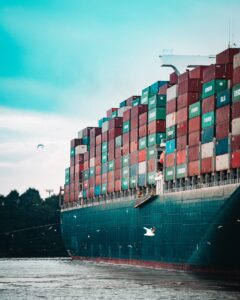The importance of compliance in customs classification
Topics

If you’re involved in international trade, you’ll know the significance of compliance in shipping goods across borders cannot be overstated and that navigating different countries’ customs procedures is complex and time-consuming. Beyond being a regulatory obligation, compliance is the keystone that ensures a smooth, efficient, and risk-free international shipping experience.

There is a digital revolution taking place right now in compliance which is changing the way we operate. Where some businesses still operate customs classification by manual processes, many forward-looking businesses have invested in solutions such as TariffTel in a bid to expel the grey areas arising from manual inputs and are increasingly looking to augment their capabilities and accuracy with technology that can support the whole business. Customs classification is important for all businesses who import and export goods internationally, affecting many different departments in a business from sales to warehousing, all those who contribute to ensuring stock arrives on shelves or machine parts are available in the warehouse at the right time. Hold ups in shipment can mean extra costs and missed potential sales so compliance in assigning the correct HS codes and ensuring goods arrive at their destination on time has never been more critical. Business critical in fact.
This blog delves into why compliance is now no longer just a tick-box exercise for businesses, but a necessity to get right every time, when it comes to global shipping operations. We look into why upholding a rigorous stance on compliance serves as a protective shield against potential shipping roadblocks.
Understanding the complexity of international shipping
 As businesses expand beyond their domestic borders, they encounter the intricate web of international shipping and customs regulations. Each country presents its own set of import and export rules, duties, tariffs, and documentation prerequisites. Successfully manoeuvring through this intricate landscape requires a careful and diligent approach to compliance. A single misstep can set off a chain reaction of delays, penalties, or even the seizure of goods. Embracing and prioritising compliance is without question a strategic imperative, enabling companies to navigate this complexity smoothly whilst ensuring business continuity, and safeguarding reputation.
As businesses expand beyond their domestic borders, they encounter the intricate web of international shipping and customs regulations. Each country presents its own set of import and export rules, duties, tariffs, and documentation prerequisites. Successfully manoeuvring through this intricate landscape requires a careful and diligent approach to compliance. A single misstep can set off a chain reaction of delays, penalties, or even the seizure of goods. Embracing and prioritising compliance is without question a strategic imperative, enabling companies to navigate this complexity smoothly whilst ensuring business continuity, and safeguarding reputation.
It’s important to note that compliance isn’t solely confined to customs and border control agencies. It extends its reach throughout the entire shipping process, encompassing elements such as precise documentation and transparent declarations. Neglecting these vital aspects can cause disruptions in supply chains, leading to delivery delays and potential revenue loss.
Risks of non-compliance
By embracing compliance, companies not only ensure regulatory alignment but also build a robust shield against potential risks.
Financial:
Non-compliance with international trade regulations can cast a shadow over a company’s whole global operations, potentially bringing about financial setbacks or damaging a company’s reputation. Among these risks, financial penalties and fines act as deterrents and fines can be back-dated for 3 years to make up for under-payment of duties owed, for example. Governments and regulatory bodies across countries enforce compliance through fines, which can escalate quickly depending on the severity of the violation. Such penalties can mean that funds are diverted from elsewhere in the business such as growth initiatives or employee development.
Delays and disruptions:
Delays and disruptions emerge as another critical risk arising from non-compliance. Customs and border control agencies play a pivotal role in international trade, with the power to halt goods for inspection or verification of documentation. Non-compliant shipments are susceptible to longer processing times, leading to shipment delays that can fall through the supply chain. Consequently, production schedules may be thrown off track, triggering a domino effect on downstream processes and customer commitments.
Confiscation of goods:
The threat of goods confiscation looms as a tangible risk, particularly for companies that overlook or deliberately sidestep trade regulations. Customs authorities possess the authority to seize and hold goods that fail to comply with custom regulations. This can be financially disastrous, as the company not only loses the value of the confiscated goods but also incurs additional costs associated with storage, retrieval, and potential legal proceedings. It can also impact supplier relations.
Loss of market access:
Another risk is the potential loss of market access. Non-compliance can trigger trade restrictions or bans that restrict a company’s entry into certain markets. This not only limits growth opportunities but also weakens the company’s global footprint. Similarly, the removal of trade privileges can be a severe blow to companies that rely on preferential tariffs or trade agreements to remain competitive.
Brand reputation:
The ethical consumer of today has high expectations for businesses they buy from and being compliant is something they look for in their ethics and values. Businesses that prioritise compliance are seen as responsible and trustworthy, fostering brand loyalty and customer advocacy.
Navigating trade compliance
Compliance and customs classification go hand in hand in today’s trading environment. Where once assigning HS codes may have been siloed to a small team, it now expands to many areas of a business. It involves a more collaborative approach and is considered a business-critical function for large enterprises as well as expanding businesses trading internationally and with growth in their sights.
Having the right technology solution in place to accurately document, manage and assign HS codes across all areas of the business involved in the supply chain ensures a more streamlined approach where compliance is at the centre. A solution like TariffTel is an advanced customs classification solution, ensuring accurate and compliant HS code assignment every time and is trusted by leading businesses such as M&S, boohoo, Primark and ASDA. TariffTel empowers businesses to make informed decisions about their global trade operations and confidently navigate the intricate world of compliance.
To book a demo and find out more about TariffTel please contact our expert team.
Other Useful Resources
Windsor Framework update: Key details ahead of 1st May 2025 implementation
The Windsor Framework's latest updates come into effect on 1st May 2025, introducing new trading arrangements between Gr...
From spreadsheet chaos to smart compliance
Data accuracy matters more than you think in customs classification. In global trade, the difference between complian...
Adapting to an ever-changing regulatory environment
In the fast-moving world of international trade, compliance is more than just a legal necessity; it’s a competitive ad...



